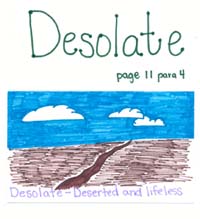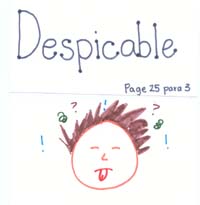
Jessica Coulter, Kristy Familar
Lara Seagle, Louise Urban
Your job is to come up with five thinking questions. You want to make your group to think about what they have just read. It is important to ask thinking questions and not just questions that are right in the book. For this section you are to include two MCEOG questions, one problem/solution, one setting, and one fact/opinion.
When Stanley got to the camp he had to all of the following except:
a. Dig two holes a day
b. Watch out for yellow spotted lizards
c. Measure his hole by his shovel
d. Eat breakfast at 4:30
Answer: The answer is ‘a’ because he is asked to dig only
one hole a day. Page 13.
Stanley is adviced not to run away because:
a. There are no guard towers
b. He is afraid of the guns
c. The electric fences are too high
d. The camp is the only place with water
Answer: The camp is the only place with water for 100
miles around. Page 14-15
Describe the setting of the story at Camp Green Lake.
Answer: “Stanley looked out the dirty window. He
couldn’t see a lake. And hardly anything was green… The land was
barren and desolate. He could see a few rundown buildings and some
tents. Farther away there was a cabin beneath two tall trees.
Those two trees were the only plant life he could see. There weren’t
even weeds” (pg 10-11).
What had Stanley done to be placed at Camp Green Lake? What
was his solution for the reason this happened to him?
Answer: Stanley had been walking home when a pair of sneakers
had “fallen from the sky.” He was running home to take them to his
father when a police officer stopped him and asked him why he was running.
When the officer saw the shoes, Stanley was arrested because they were
Clyde Livingston’s shoes that he had donated to charity (pg 23-24).
Stanley blamed all this on his no-good-dirty-rotten-pig-stealing-great-great-grandfather
(pg. 7).
Do you think that Stanley was guilty of the crime?
Answer: I think Stanley was at the wrong place at the
wrong time. He was an innocent by-stander who happened by on a old
pair of shoes. How was he suppose to know they were Sweet Feet’s
shoes (pg. 22)?
Your job is to choose four passages from the reading that you want to discuss with your group. For this section you should include a passage that is descriptive, sad, foreshadowing, and interesting.
1. Page nine paragraph two
2. “Everyone in…before him.”
3. This is a good example of an interesting passage because it describes
what type of family from which Stanley comes.
4. Why would Stanley’s family continue on with this silly arrangement
of names?
Answer: Stanley’s family is a very simple family and they enjoy
the good and simple things in life. One of them includes naming their
children the same name forward and backwards to keep things easy and simple.
5. The author included this in the story because it shows what type
of family Stanley is part of. It demonstrates a little bit of Stanley’s
character and his family.
1. Page 3 paragraph two
2. “There used…lived there.”
3. This is a good example a foreshadowing passage because it describes
how the town and the lake disappeared. It compares the lake to the
town and people.
4. Why is it important to know what happened to the town of Green Lake?
Answer: It is important to know what happened to Green Lake because
these boys are being punished in the same weather and land that the biggest
lake in Texas dried up in. This punishment is beyond belief for these
young boys.
5. This passage was included because it is telling what happened to
the town. It is important in this story because this lakebed is now
where young boys are now digging holes everyday. If the town shriveled
up and died, one can only imagine what is happening to the boys.
1. Page 7 paragraph one
2. He didn’t…both of them.
3. This is a sad description of the pain and suffering that Stanley
had to go through at home before he was sent off to Camp Green Lake.
4. How can Stanley’s weight be important to the rest of the story?
Do you think this is a foreshadowing of something important that will happen
later on in the story?
Answer: Stanley’s weight is important because he was not fit
to do the work at the camp. Perhaps it is foreshadowing that he will
become physically fit and do something to prove his innocence.
5. Stanley was not physically fit to be doing the work that he had
to do at Camp Green Lake. This passage was put in the story to show
that at home he was not accepted and here he was looking for acceptance.
1. Page 26 paragraph one
2. “The shovel…bones rattle”
3. This is an example of a descriptive passage. Stanley is forced
to dig holes and this describes his first encounter with the lake.
4. Describe how disappointed Stanley must feel to be punished in this
way.
Answer: Stanley knows that he is innocent and realizes that he
has a hard and terrible day in front of him. He is probably feeling
infuriated with the system that they did not believe him when he told the
truth.
5. This is another passage that demonstrates how unprepared Stanley
is for the torture he is being put through. The soft fleshy hands
can be compared to that of a baby and that is what Stanley is like, a baby,
because he is innocent and naive.





Your job is to choose an interesting character from the section you
read. You will find three character traits and proof of that trait,
the character’s goals, and the problem and solution of the character.
Finally you must illustrate your
character.
Character Traits:
Lonely - Page 7 paragraph 1 - Stanley says that he did not have
any friends back home and he was often teased by his classmates as well
as his teachers.
Unlucky - Page 7 paragraphs 4-6 - He just happened to be at the wrong place at the wrong time and it is something that is obviously part of his family and all of their bad luck because of his "no-good-dirty-rotten-pig-stealing-great-great-grandfather.
Honest - Page 25 paragraph 2 - Stanley told the truth in the courtroom even though he knew that if he had lied just a little he probably would have gotten a lesser sentence or not have been punished at all.
Goal: Stanley's goal is to survive Camp Green Lake. He realizes that it is not going to be easy here and he is a little scared and worried about what lays ahead of him.
Problem: Stanley was at the wrong place at the wrong time and was convicted of stealing Clyde Livingston's shoes that he donated to charity. He now has to serve a term at Camp Green Lake digging holes to "build character."
Solution: He blames his bad luck on his no-good-dirty-rotten-pig-stealing-great-great-grandfather. He is comforted in this thought and he tries to make the best out of his situation.

Your job is to draw something that is related to the story. It
can be anything from a sketch or cartoon to a flow chart or diagram.
After finishing your picture, write about your drawing and include: who
or what the picture is about, where the picture takes place, when it is
happening, and why you drew it.

I drew a picture of Camp Green Lake when Stanley first gets there and
sees the lake for the first time. The setting of the story seems
to be very important to what the book is about and how it will influence
who Stanley becomes. It seems interesting and exciting to think about
why there are so many holes on the lake bed and what signifcance the holes
will have on the rest of the story. Why arer they there and what
do they mean?